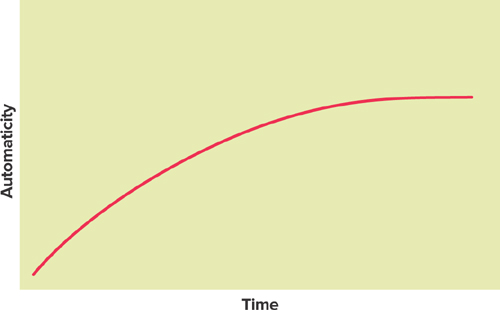37. Forming A Habit Takes a Long Time and Requires Small Steps
When you wake up in the morning, you brush your teeth, then check your iPhone and email, then take a shower, and then get dressed (or whatever your particular pattern is). You do this every day. It’s a habit. Why are you motivated to do these same tasks every day? What did it take for these activities to become a habit? What would it take to change the habit to something else?
Philippa Lally (2010) recently studied the “how” and “how long” of forming habits. She had people choose an eating, drinking, or activity behavior to carry out every day for 12 weeks. In addition, the participants had to go online and complete a habit index each day to record whether or not they had carried out the behavior.
How Long It Takes to Cement a Habit
The average amount of time it took for people to form a habit was 66 days, but that number doesn’t really tell the story, because there was a wide range. For some people and some behaviors, it took 18 days, but depending on the person and the behavior, it went all the way up to 254 days for the behavior to become an automatic habit. This is a lot longer than has been written about before. Lally found that people would initially show an increase in the automaticity of the behavior, and then they would hit a plateau: Their behavior followed an asymptote curve (Figure 37.1).
Figure 37.1. Creating a new habit forms an asymptote curve.
Work in small steps
If you want people to change something that has become a habit, you will need to be patient. You may need to break the behavior down into small steps and work on a step at a time. For example, instead of giving one presentation on the 10 steps that people should take to be more productive with time management, you might want to have a series of presentations and just cover one step at a time.
Some Behaviors Become Habits Faster Than Others
The more complex the behavior, the longer it took to become a habit (no surprise there). Participants who chose to create an exercise habit took one-and-a-half times longer to make it automatic than those who were building a new habit about eating fruit at lunch.
How Bad is It to Miss a Day?
Lally found that if people missed a day here and there, it didn’t have a significant effect on how long it took to build the habit. But too many missed days, or multiple days in a row, did have an effect, and slowed the creation of the habit. Not surprisingly, the more consistent people were, the more quickly they reached the automatic point, although missing one day did not delay habit formation. Missing two or more days did.
![]() Don’t hesitate to forgive yourself
Don’t hesitate to forgive yourself
Michael Wohl (2010) found that the most effective way to prevent procrastination in the future is to forgive yourself now for the procrastinating you’ve done in the past.

